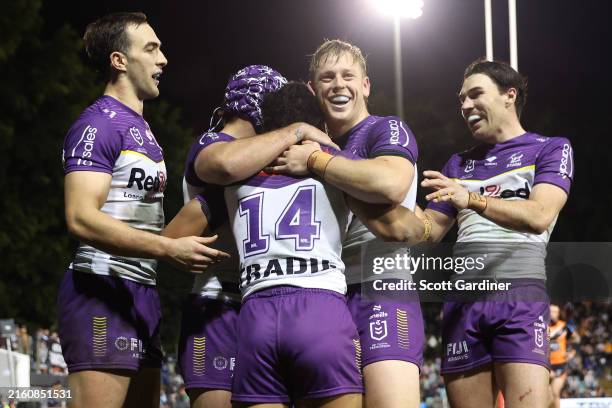After yet another humiliating loss on Friday night, Michael Maguire’s days at South Sydney are numbered.
Or at least they should be, given the way many clubs within the NRL have chosen to deal with coaches when they hit hard times and wins become more difficult to find than oversized pumpkins in a supermarket around Halloween.
Take Jason Taylor for example, the man dumped by the Wests Tigers at the beginning of this year following a run of losses and two years without finals football. He has since been replaced by Ivan Cleary but the way with which he was forced out of the club and to the back of the unemployment line was unjust and based on flimsy reasoning.
The Wests Tigers finished 15th in 2015 and 9th a year later, missing out on the finals by a point. But after just three rounds of the new season, he was thrown out quicker than a misbehaving partygoer at a night club after back-to-back losses including a 40 point thumping at the hands of the Canberra Raiders in the nation’s capital.
Club officials are quick to lay blame on the coach when their side’s on-field performances are not up to scratch, and this was certainly the case at the Wests Tigers earlier this year.
The writing was on the wall for Taylor long before his sacking when Robbie Farah, the clubs’ favourite son, was dropped to reserve grade despite appearing for NSW in Origin just weeks earlier.
Then, when he was eventually pushed out and forced to find another club at the end of the 2016 season, after making a late plea to remain a one club player in the Tigers’ heartbreaking defeat to Canberra at Leichardt in round 26, Taylor’s days were suddenly numbered.
The Tigers poor early season form was all the convincing the club needed to put the final nail in JT’s coffin. A day later he was clearing his desk and drafting a resume.
True, if a club has made a habit of missing finals the coach needs to go because they are clearly incapable of getting the most out of their players or coming up with match-winning game plans. But the Wests Tigers, like many other NRL clubs, seem to feel that if things aren’t going well on the field, it is the fault of the coach, even if the players at their disposal aren’t capable of matching it with the rest of the competition.
This from a club that kept a coach on its books for close to a decade after winning just one premiership and qualifying for the finals on three occasions thereafter.
So how does this relate to Maguire?
Put simply, he may end up the victim of another unjust sacking by an NRL club that believes its coach is the reason for a drop in performance. Not poor management, as in the case of the Tigers, or a lack of player depth which, again, is not the sole responsibility of the coach or something they may have any input in at all.
Since winning the premiership in 2014, Souths have finished 7th, where they made it as far as the qualifying finals, and 12th in a disappointing 2016 season. Once again this year, it looks as if they are destined to finish in the bottom eight. Maybe even the bottom four.
So how will a famous club with a thirst for premiership success like South Sydney respond to this kind of failure? If they are anything like the other proud Sydney clubs and are following the trend of making the coach the fall guy for circumstances beyond his control, he’ll be sacked using the age old excuse that they are “rebuilding the club” or “restructuring the way we go about business”.
But these excuses don’t hold up anymore. Only nine months ago Paul McGregor was on the outer at St George Illawarra along with Peter Doust who were, apparently, both to blame for the Dragons’ underwhelming performances.
Making Doust the scapegoat is understandable, he is in an authority position and is responsible for making decisions that directly influence on-field performance. But blaming McGregor, a man who had been in control of the club for just two full seasons, was hard to stomach.
Already this year, with the same two men at the head of the table, the Dragons have climbed the ladder and are sitting pretty in third position with seven wins and four losses. Yet McGregor and Doust could’ve been handing in their applications to rival organisations in the lead up to Christmas last year.
Then there’s the case of Geoff Toovey who, after four seasons in charge, was sacked in sensational circumstances with the return of advisor and Manly legend Bob Fulton. This despite missing the finals on just one occassion and qualifying for a Grand Final in 2013.
Des Hasler was also within a hair’s breadth of parting ways with Canterbury earlier this year. His record speaks for itself but after the Bulldogs got their season off to a slow start he was being held accountable for his players’ poor form.
So yes, Maguire has plenty to be concerned about. Like Toovey, he has experienced great success during his time as head coach but has suddenly fallen on hard times. The Rabbitohs are struggling to compete with the best teams in the comp and are a shadow of the side that won the Grand Final in 2014; sitting in 15th position and moving in a southerly direction.
Unlike Taylor, and McGregor to an extent, he is operating under a more sturdy board with few weak links and a good track record.
Yet, in much the same fashion as the former Wests Tigers coach, he is leading a team full of fallen champions, fading stars, and young footballers who are fresh to first grade and struggling to establish a foothold.
Maguire has been a fine coach for a long time but will soon fall victim to the modern age mindset that changing the coach will help reverse a sides’ fortunes while the players get off scot-free even though they are the ones participating in the game.
Why must we continue to force the coach to own the teams’ performance after just a few years in charge? Yes, he is responsible for improving and optimising the quality of the players he has at his disposal, but, contrary to popular opinion, he takes no part in the game and is not capable of throwing a pass to his winger or completing a set of six, even if his job, by very definition, is to give that player the best chance to succeed in doing so.
Give coaches a chance to build a legacy. If at this stage the side is still struggling, then consider making personnel changes at the top.
Forcing change because a club is unfamiliar and uncomfortable with failure and the thought of missing finals will rarely result in improved performance. Surely clubs have learned this lesson by now.
Club members will only renew their membership if the team is experiencing success. Sponsors too are drawn to clubs with a rich history of premiership glory. We live in a result driven world so it is understandable that clubs will go searching for answers when things go awry.
But we are asking too much of coaches and laying blame on the blameless when it should be attributed elsewhere – to the players who are a protected spices in the 21st century.






